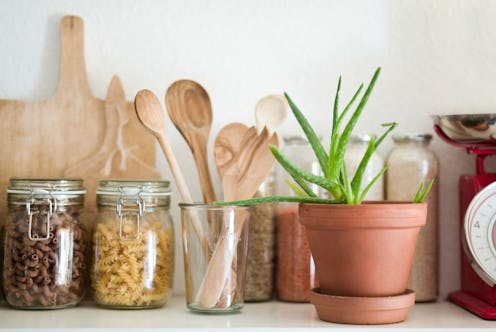Life
These Simple Planet-Saving Tips Will Get You Well On Your Way To Zero-Waste Living
Looking after the planet and finding ways to combat climate change are an ongoing conversation, but climate action is really taking centre stage at the moment. Everyone has a part to play in looking after the planet but sometimes it's tricky to know what to do in our day-to-day lives beyond recycling to help out with this urgent issue. But perhaps living a zero-waste lifestyle could be the change we all need to introduce into our lives.
With Extinction Rebellion protesters taking to central London this April, youth strikes happening across the globe, and the Black Lives Matter movement continuously protesting against environmental racism, it's clear that this is an issue isn't going to go away and that it will take everybody's involvement to solve. While policies need to change in our governments, there are still things that can be done on an individual level to help the climate problem — one being producing less waste.
According to the National Geographic, 40 percent of all plastic produced is packaging which is used just once and then discarded, and 18 billion pounds of plastic waste flows into the oceans each year. And as the BBC reports 8,300 million tonnes of plastic has been produced in total, half of this plastic was made in the past 13 years and and of all plastic that's ever been discarded, only roughly 9% has been recycled. While recycling is important and should be done if you do use or come across plastic, trying to avoid creating waste all together is a much better option.
Zero-waste seems like a buzz word at the moment but what does it actually mean and what are the best ways of introducing a zero-waste lifestyle? Although it differs from person-to-person, as The Guardian reports, essentially the zero-waste movement calls for people to produce as little waste as possible.
It can feel like an uphill struggle going waste-free in a world that makes it so damn difficult. Our supermarkets have plastic wrapped fruit and vegetables, almost all soft drinks are in plastic bottles. We're even offered plastic bags to just put our loose groceries in. On top of that not all plastics and papers are even recyclable .As Smithsonian magazine reports, plastic grocery bags, take out containers, and even dirty napkins often can't be recycled, even if they are made out of paper — anything recycle that has been permanently soiled by food goes in the waste.
It's no easy feat trying to avoid waste. It does take some effort but a few simple lifestyle changes can really help. Having a reusable metal water bottle instead of buying water in plastic bottles can reduce your waste. Bringing tote bags on shopping trips, buying clothes second-hand, and composting food waste are all wonderful ways to reduce overall waste.
And companies are catching on to the much-needed interest in sustainability. There are now even zero-waste shops. Instead of using plastic containers or bags, customers are encouraged to come with their own containers and fill up on loose products. There are also cosmetic companies like Ethique, the world's first zero-waste beauty brand, who have created solid toiletries so no plastic has to be used.
Everyone should do what they can (within their means) when it comes to living a more sustainable life. We all, especially those of us in the West, have a responsibility to help look after the planet before it's too late.
